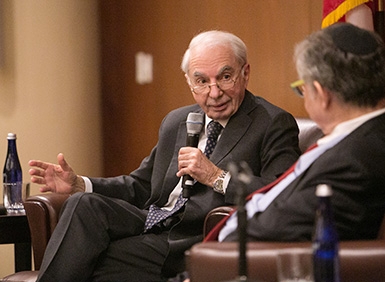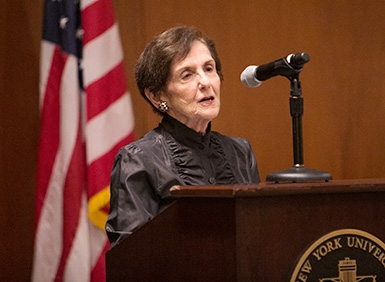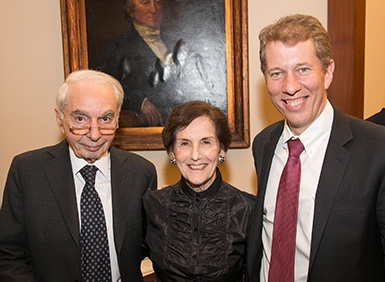At Hauser Global Law School Program Annual Dinner, former Italian prime minister Giuliano Amato considers Europe’s future
This year’s Hauser Global Law School Program Annual Dinner occurred exactly one week before a fateful national election in the Netherlands served as a closely watched referendum on nationalist politics. The dinner’s featured conversation between former Italian prime minister Giuliano Amato, now a judge of the Constitutional Court of Italy, and University Professor J. H. H. Weiler, co-director of the Jean Monnet Center for International and Regional Economic Law & Justice, focused on a timely topic: Europe after Brexit.
The program began with remarks from Dean Trevor Morrison; Florence Ellinwood Allen Professor of Law Gráinne de Búrca, faculty director of the Hauser Global Law School Program and co-director of the Jean Monnet Center; and NYU Law Board of Trustees member and alumna Rita Hauser, who introduced the main event. In their conversation, Amato and Weiler suggested that Europe is reeling, not only from Brexit but also the victory of nationalist politician Donald Trump in the US and similar political stirrings in France and Germany as they prepared for their own national elections. The strength of the European Union and its multinational ideals have been sorely tested, Amato said, by a recent flood of immigrants and overlapping onslaughts including an economic and financial crisis and deadly terrorist attacks.
Brexit, Weiler argued, is only part of the picture; he said he was not surprised that the UK voted to leave the EU, since, in his view, the UK had never been wholly enthusiastic about being a member state. Continental Europe and its disaffected citizens, Weiler added, were the source of the real worry. “There’s a feeling of disappointment, a feeling of skepticism. Euro skepticism is not marginal. I’m sure the Union will survive, but the level of discontent is higher than we might have predicted.”
Weiler pointed to steadily declining voter participation in European Parliament elections between 1979 and 2014 as indicative of growing disillusionment. “In two very primitive senses, our system of governance in Europe does not respect the two most primitive hallmarks of democracy,” he said. “One, we don’t have that basic right to throw the scoundrels out. Elections to the European Parliament do not in a meaningful way determine who will govern us.” Second, he added, “Regardless of the pluralities or majorities voting for the European Parliament, nobody has been able to link in a systematic way the voter preference in elections to European Parliament and the policies adopted by the European Union.” Many citizens of EU member states, Weiler suggested, thought, “‘It won’t determine who governs me, and it won’t determine how I will be governed. Why shall I vote?’”
Amato named an “overdose of austerity” as a major factor in member states’ economic difficulties, adding that the underutilization of the EU’s European Social Fund to help stave off fiscal problems had also played a role. He focused also on institutional mechanisms, arguing that when proposed legislation goes from the European Commission to the European Council, “national interests enter the scene and might require the initial proposal to adapt to this or that demand by national interests…. National interests reflect national positions, and national positions in these years of difficulty have become more and more intolerant of the positions of the others.”
Consensus on issues related to previously held common values such as human rights protection, tolerance, and EU solidarity had fractured, Amato said: “For the first time in our history, we have procedures going on against two of our member states for violations of the rule of law.” He suggested that more practical types of consensus might form around initiatives such as common border defense.
In the end, Weiler acknowledged there are reasons for cautious optimism, as did Amato, who contrasted the older generations with the younger: “I admire the children of our primary schools… that live with diversity as their ordinary lives. The color of the skin, the religion, the attitudes are not so important. They are children, and they learn how to live together without problems, without difficulties, without fear.”
Posted March 23, 2017; Updated August 4, 2017




